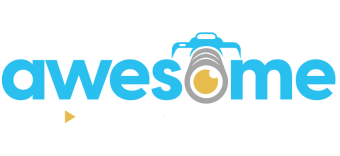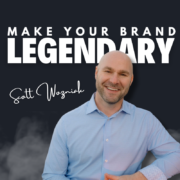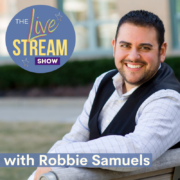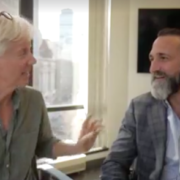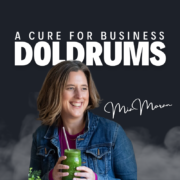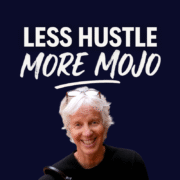161. Is Your Brand Legendary? with Scott Wozniak
I love the word legendary. But when it comes to your work or your business, how to you become legendary?
Think of a popular brand you know, like Apple, Harley-Davidson or Disney.
When you see or hear these names, does something click in your mind that goes way beyond mere familiarity?
Of course, you know about their product or service offerings, but I’m willing to bet you have a much deeper, more profound, and even emotional connection to these businesses.
(Think about the long lines of people camped outside the Apple store every time they launch a new iphone).
These aren’t just brands; they’re legendary brands.And they don’t just have satisfied customers (like you); they’ve created raving fans—the true believers who buy every product, who spread their message and who will stand up to defend the honor and reputation of these multibillion-dollar corporations.
(Full transparancy here: I’m a loyal Apple user. I currently own what is my 5th iphone, and a macbook pro, mac mini, imac and ipad – and do my video editing on Final Cut Pro)
But, for the small business person, what can you learn from these big companies that can help make your own brand legendary?
Well that’s what this week’s guest, author and consultant Scott Wozniak broke down for us.
Scott’s the author of “Make Your Brand Legendary: Create Raving Fans With the Customer Experience Engine.”
Scott shared the set of systems he’s discovered that all the great brands use to create raving fans that he calls the Customer Experience Engine – a simple tool to help leaders become legends.
So, if you’re wanting to create those same kinds of raving fans that always seem to dominate dinner-party conversations and online chat boards then listen up!
Resources
Thanks for listening to The Standout Business Show: Content Marketing Tips, Personal Brand Tips & Video Marketing Tips for coaches, consultants & agencies.
If you liked this episode please leave us a 5 start review & share it with a friend!
Transcript
Scott Wozniak:
It’s this personal touch. See, we think the question your customers start asking now is do you care about me, do you see me, do I matter to you, or or is this just another transaction for you? This is like one of those deep human desires is people want to be seen and liked. Once or twice a year, do one or two things and you’ll blow their mind. I mean, it’s not that complicated. Once or twice a year, you just do something that says, hey, I know you, you in particular, and that little personal touch unlocks this next kind of relationship and it feels like this is a relationship, not just a transaction. And so, yeah, build trust, can we count on them? And then now I want to know do you care about me? We just little things, say I remember you in particular and I like you, and that that unlocks another category of customer relationship.
Brad Powell:
Welcome to the Standout Business Show, where it’s all about making a bigger difference by doing business differently show, where it’s all about making a bigger difference by doing business differently. I’m Brad Powell, your standout business coach, and today we’re asking the question is your brand legendary? So I want you to think about any popular brand that you know, like Apple, harley, davidson, disney and when you see or hear these names does something just kind of click in your brain that goes way beyond mere familiarity. Of course, you probably know about all their products and services, but I’m willing to bet that you have a much deeper and more profound, even emotional, connection to these businesses. Like, think about the long lines of people who are camped outside Apple Store every single time they’d launch a new iPhone. These aren’t just brands, they are legendary brands. They don’t just have satisfied customers like you, they’ve created raving fans. They buy every product. They got an iPad and I do all my video editing on Final Cut Pro. So, like I’m, I’m goner. But for the small business person, like most of us, what can we learn from these really big companies that can actually help make your own brand legendary?
Brad Powell:
Well, that’s what this week’s guest who’s author and consultant, scott Wozniak. He’s going to break this down for us. Scott’s the author of Make your Brand Legendary Create Raving Fans with the Customer Experience Engine. With the Customer Experience Engine, scott’s going to share a set of systems that he’s discovered that all the great brands use to create raving fans, that he calls the Customer Experience Engine. It’s a simple tool to help leaders become legends. So if you’re wanting to create those same kinds of raving fans that will always seem to dominate the conversations on social media and online chat boards, then stay tuned and let’s start the show. All right, scott, welcome to the show.
Scott Wozniak:
Man, it’s so good to be here. Thanks for having me here.
Brad Powell:
Thanks for having me. Yeah, and you know, when it comes to looking at really large companies like Apple, for instance just about the biggest and most lucrative company on the planet a small business guy like myself goes oh, they just must have some kind of magic trick. Like how do they do this in terms of getting people who are dyed in the wool longtime Apple fans always going to show up? You know the day of the next big event that they pull, and it just keeps happening again and again, and again.
Brad Powell:
And it’s like well, you know how do I compete with that or how do I do anything like that? And what I really like about the book that you’ve put together is that you’ve removed some of that mystique around it and really boiled it down to something very simple. So talk about that a little bit as we open up this conversation, like how your approach has been really in big part to kind of simplify this idea of oh gosh, you know they’re giant, they have tons of resources and money. I could never do anything like that.
Scott Wozniak:
Yeah, it comes from my career. So I became a consultant, was traveling, trying to help people do things, and I got a couple of niche specialties. And then, long story short, I had a really unique opportunity. I happened to go to high school with some of the folks that own and are senior leaders at the Chick-fil-A headquarters, you know. Back then this is 30 some years ago I was like, hey, good luck with your little restaurant company.
Scott Wozniak:
I hope you make it. Yeah, they’re going to make it. So I became this consultant and then I was visiting home, hanging out with my old high school buddies, and they’re like, wait, maybe you should come do this for us. And so I had a really unique job, and that job forced me into this simplification process you’re talking about, because I didn’t run a department, I floated across the company and my job was literally this go travel the world, go inside the great companies, learn how they do it like several of them and then come back and teach us about it. And it was that come back and teach us about it.
Scott Wozniak:
That was the challenging part of how do I summarize what I’ve done the last nine months with these seven companies, or five groups? How do I explain it? What are the commonalities? And as I started doing that, we would just pick an area hey, we need to fix this area or improve this zone, or how do we change that. And we started noticing a pattern. Like man, all of them have some version of this and all of them have some version of that. And then I would go to another company and say, hey, we started with Chick-fil-A. Hey, let’s do this.
Scott Wozniak:
And eventually I wrote a couple of books and long story short, felt like I needed to leave and go build my own firm and the first client assigned me was Chick-fil-A. So I get to keep working with them, but now I’ve helped them like this translation prompt. It’s the fun part is the learning part. Where I really probably make the most value is translating, communicating all that back into some format that a different industry or a different setting can use and say, okay, yeah, here’s the surface, but this is why this is what made it work, here’s the tool they used, and you should put different numbers in there, but it’s really turned out to be.
Scott Wozniak:
It’s not magic. I mean I love the way you said it. Right, there’s a mystique about it and that’s part of the fun. But if you’re a leader trying to build it, it’s the same kind of engine and that’s part of why I love this engine metaphor. Engines are predictable, engines are systematic and they also are under the hood. Right, you have this beautiful, shiny exterior and you and I might have a totally different car body, but we can wrap the same engine inside of all that Say, okay, what’s driving us? You’ve got this sweet a convertible sports car and I’ve got a truck, but we both have the same engine that pushes us at the same speed and same direction. It really isn’t magic, it’s a system, it’s a set of systems that when you stack them, they just work.
Scott Wozniak:
And in fact, let me give one more little bonus here, because right about now, in my experience, there’s some folks who are listening. Maybe you’re watching and you’re like okay, this isn’t for me. Like all the people you’re talking about are consumer brands. Right, they sell Harley, right, chick-fil-a Disney theme parks. That’s the division. I’ve not spent my time in Disney conglomerate. I’ve spent a lot of time with the theme park leaders figuring that world out. But you’re like listen, I’m not a theme park, I don’t sell, you know, sexy electronics like Apple. Like, we’re B2B, we’re technical, it’s kind of a price sensitive market. You can’t do it for me and that’s just wrong. I have seen, I’ve worked with people doing this in the technical B2B spaces, from construction, manufacturing, chemicals, government industries, nonprofits, like the kind of categories you’d say you just can’t do it and it’s being done. It may be more challenging for you legitimately, but that means when you install these systems you’ll just stand out that much more because no one else in your space is doing it.
Brad Powell:
Yeah, Okay, Well, let’s just walk through it. I mean, if the idea is that you can put the same engine parts under the hood of your business vehicle and you know, I’ve been watching these British mystery shows there’s one. Recently I came across one that’s called Dog Leash and the guy who’s like a chief inspector for Scotland Yard and he drives a 1971 Jaguar, it’s now like my favorite car. It’s like I don’t know where you get one of those, but I sure want one. So anyway, I want to put my cool legendary brand engine under the hood of that car.
Scott Wozniak:
Nice choice.
Brad Powell:
So where do I start? Like, what’s the very first step? Now, I’ve read the book and I kind of know some of the answer, but you know for the lay person out there, where should they be thinking?
Scott Wozniak:
Yeah, brad, it starts the fuel that pours in the engine we call customer insight. Do you really know your customers? And what we find is most people have customer data, not customer insight. Right, they know facts, what they buy, when they buy, where, but they don’t know why. Why’d they pick you? What is it about you? They like why are they staying around? What parts don’t they care about? Bigger question what are they trying to accomplish because of you? I mean hard truth. They don’t care about your stuff. They care how your stuff makes their life better. So if you don’t know their life goals, their business goals, then how can you design something better and faster and make more effective? And I see a lot of people throw wasted effort and time because they don’t have real insight driving their engine. They just kind of raw data. And so this is where we start is how well can you describe your customer, their goals, their life and where you fit in it, and the more insight and understanding and depth you have on really who you serve the easier everything else is.
Brad Powell:
Yeah, I think that’s one of the mistakes that a lot of people make in their thinking about this. I mean, simon Sinek blew up because of. He always say start with why.
Brad Powell:
And to me it’s like yeah, okay, well, that’s cool, Like, why are you doing this? Like you know that’s, that’s great for you, but it’s really like, why does it matter to me? Yes, start with their, why it really wants to be turned around. That’s a big miss trick, I think, in a lot of people when they read you know, start with why I went okay. All I have to do is sort of profess my the mission that I’m on and why I’m so purposeful and I’m done. Yeah, it.
Scott Wozniak:
Yeah, it’s the old field of dreams myth. Right, if you build it, they will come. And if, like, if you have a beautiful why? And so you get these really smart people who bury themselves in their garage for a year dreaming and crafting and then they throw it in the market and hope somebody reacts. It works sometimes, but only sometimes. If you really want to do this, you start with your customers why and what they care about and where their pain points are and their dreams. And then you reverse engineer and say, well, now let’s go in the garage and build something that will solve that problem and it’s much less risky. People think being an entrepreneur is crazy risky and it only is if you get these backwards, if you actually know your people well. This isn’t a wild swing in the dark that you hope somebody will like um, it’s like no, I know what they want.
Brad Powell:
they want that yeah, right, exactly if you can do something where they feel like you’re reading their mind.
Scott Wozniak:
Yeah. Now what’s interesting is Apple. Apple got there but didn’t get there through a passive process. This doesn’t mean you abdicate your your creativity, doesn’t mean you don’t put something new or different in the world. There’s the old, famous Henry Ford quote where he said hey, if I would have asked my customers what they wanted, they would have said a faster horse.
Scott Wozniak:
Jobs was kind of infamously arrogant about how he knew better. It turns out he did actually know better. I don’t know that means we should be as arrogant as him. But how he knew better was because he went deep in that world, worked with those people, knew that stuff, and it was a bunch of his personal insights that were driving it. So I would suggest there were customer insights driving Apple’s creative decision.
Scott Wozniak:
Makingmaking. Now, now they do a lot of really advanced, world-class customer insight work. But even then jobs was using customer insight. He just was using his own personal experience to drive that. Um, quick example in the early max he put fonts on the machine and like it’s just a business machine, nobody cares about the fancy font. And he had personal experience with calligraphy in college that led him to say, hey, this is actually more meaningful to people than they realize. I saw the passion of what happens. So again he, he tested it in the real world. Um, he just he was a one-man customer insight team. Uh, so I don’t recommend that approach because that’s increasing the risk. You better hope you don’t make mistakes.
Brad Powell:
And.
Scott Wozniak:
FYI. He made a lot of mistakes and almost some of his in-between eras, some of those companies all collapsed and failed because he did not get the customer insight correct. But yes, even Jobs and Ford had an insight on what the customers wanted. That doesn’t mean you do what they say, but you do understand them right. Customers are really good at describing their dreams and pains. They’re really bad at telling you how to fix that. That’s your expertise. So you do bring something to the table they don’t have. But it starts with what do they really want?
Brad Powell:
Yeah right, all right. So if we have some semblance of what our customers are thinking, the next step you call operational excellence, which to me it seems a little bit like well, table stakes, you know, like if you’re in business you need to be good at it and that’s. It’s not even necessarily a differentiator, it’s just like well, we do this good work. But how do you describe that level and how do you help people set the bar so that it’s high enough? Yeah, In the excellence realm of the spectrum.
Scott Wozniak:
Well, brad, I’m not surprised that you consider that table stakes. Just getting to know you, getting ready for this, that’s who you are. How do I put this gently? You’re not standard. There’s a lot more people who are close enough when it comes to operational excellence and they want to move on to the fancy stuff. Close enough doesn’t count, not in this category.
Scott Wozniak:
See, the problem is, when we think about excellence Maybe it’s me, maybe you’re one like me, if you’re listening I want to think about how good it can be when it all comes together. Right, I got proprietary tools and smart people and techniques, and this is how excellent we are. But that’s not how your customers are thinking. Your customers are asking can I trust you? Can I trust you? And trust is a different calculation than how smart and cool you can be sometimes.
Scott Wozniak:
The key is consistency, and this is the mistake we make. We get close enough, and I can talk about several really big brands that have really cool stuff, but it’s inconsistent. And here’s the hard truth we learned being inconsistently excellent earns the same trust as consistent failure. You don’t get partial credit for partial excellence. Right, like, let me think about it. Right, like that guy, he’s a great employee. I mean, he steals from us once or twice a year, but the rest of the year he’s a great guy, we love him. No, you trust him or you don’t.
Scott Wozniak:
There’s no half trust and this is the problem with the brands. Like we get there, but you know we dropped the ball one out of every 10 times, um, and I’ve seen brand after brand, like famous ones I could name, that get wrecked because they get about 90% consistent and you’re like I got kids in school like high schoolers, right, hey, 90% is not a bad grade A minus two plus Dude, as a business, 90% will wreck your trust. And then you go do the fancy stuff and they don’t believe you and you’re not getting any credit for it. You’ve got, and it’s not everything, but there’s a few things, four or five. You got to get these right or nothing else matters, and so, honestly, that’s not my favorite. I nothing else matters and so, honestly, that’s not my favorite. I like the crazy fancy, innovative stuff, but I learned the hard way early in my career. Without some fundamentals consistent every time, you don’t even have the option of doing the fancy stuff that makes them raving fans.
Brad Powell:
Yeah, that really resonates. I mean, I think it’s really, as you say, like in terms of building trust. It’s all about the relationship that you can build with your clients and customers over the long term. Yes, yes, you know, and I mean there’s nothing like people who will come back for more to grow your business and the ones who not only will they come back, but they’ll tell their friends why they keep coming back. Yeah, and you can’t get that kind of loyalty without a really close and trustful relationship.
Scott Wozniak:
Yep, and there are whole industries where everyone’s kind of given up on some parts of it, like, ah, it’s just too hard, you can’t do it. And if you show up as the one person that does this right, I mean honestly, this is Chick-fil-A. In the early days they didn’t have. When I was first knowing them. I mean they had fans but they didn’t have most of the stuff people think of. That’s like make them so special their drive-thru.
Scott Wozniak:
When I first got to know these guys, they were almost entirely mall restaurants. There were no drive-thrus. The cow campaign hadn’t been created. That’s the eat more chicken stuff. None of that. I mean, brace yourself, brad. They didn’t even have Chick-fil-A sauce.
Scott Wozniak:
These were the dark ages, man, and people loved them. You know why? Because they were one of the very few fast food places that was always fast, clean, friendly, the food was hot. I mean they just nailed the basics and that alone is enough to build a solid brand. Because nailed the basics and that alone is enough to build a solid brand, because, sadly, like most fast foods, like I mean it’s not going to be good but it’s fast, um, and like, wait, you can do good and fast. This is crazy. So so, yeah, maybe you’re in a category you’re like it’s just so hard. This is your chance. If, when you get that right, when you figure out all the systems that make it win, um, you’ll be like.
Scott Wozniak:
I’ll give you a great example. One that’s rocking and rolling right now is Bucky’s gas stations. I don’t know if you’ve messed with the Bucky’s or seen this. They have raving fans. They don’t sell gas any different than anyone else, but the way they do it, the bathroom, they’re spotless and huge. The little touches, the staff people go crazy for it for a gas station yeah, well, you know that.
Brad Powell:
That reminds me in when I was young and it seems like eons ago we’re talking last century but you could go to a gas station and they do things like check your oil and and wash your windshield. I mean that was just sort of service man, the basic thing. And then they’d also like I mean they were like your neighbor, almost, you know, like we knew the guy at the filling station and we always went to the same one because he was like our friend of ours, you know and that that’s just doesn’t exist anymore.
Brad Powell:
And how hard could it be, Like how hard could it be for any single filling station, brand or company or chain to you know, up their game just slightly.
Scott Wozniak:
Yeah, small difference, big impact. Yeah for sure?
Brad Powell:
All right, well, I get a sense of that. So now we’re going to move on to the third part of this, so jump in and tell us what that is. Yeah.
Scott Wozniak:
So talk about small things. When we do the diagram, operational excellence is a big fat gear. Right, it’s a lot of time and effort and work. It’s the momentum generated by that. You drop little gears and they just kind of run off that. So this next one in the diagram is a tiny little gear.
Scott Wozniak:
No-transcript. Do you see me? Do I matter to you, or is this just another transaction for you? It’s like one of those deep human desires is people want to be seen and liked, and so not a lot. This is where this is, unlike operational excellence, where you’re always trying to get it just consistent.
Scott Wozniak:
Once or twice a year, do one or two things and you’ll blow their mind. You don’t have to be all time best friends, but just like I’ll see you and it’s personal stuff, like we’ll use your name, we’ll say Brad, not dear customer, we’ll talk about your specific company or your situation, or we’ll even put your name on it. Or maybe there’s some tech that just proactively reaches out to you. This is not like something went wrong, I’m going to be nice in how I fix it. It’s like, hey, nothing’s wrong how you doing, just checking in what’s happening in your world, and so this kind of proactive, personalized custom stuff, one or two things. Give them a gift If you’re in B2B or maybe you’re more retail and you’re just going to do send them a little message or a note that’s personal to them handwritten cards, I mean, it’s not that complicated.
Scott Wozniak:
Once or twice a year you just do something that says hey, I know you, you particular. And that little personal touch unlocks this next kind of relationship. It’s just like we were talking about with the filling station. He remembers you and knows your name, that’s it. He doesn’t have to like hand you, you know, a box of chocolates every week and come to your house. The little touches are like that’s my guy, and it feels like this is a relationship, not just a transaction. And so, yeah, build trust, can we count on them? And then now I want to know do you care about me? We just little things Say I remember you in particular and I like you, and that unlocks another category of customer relationship.
Brad Powell:
Yeah, and this ties in actually really nicely with the next gear, which is the memorable moments. And I want to just point out that all of these things and this is like on with the theme of the show, of standing out, like all this stuff is the way in which you’re differentiating yourself. If you’re doing these pieces and adding them, sort of stacking them together all of a sudden, you’re quite distinctive from just about the way everybody else is operating. So let’s talk about doing something memorable, because I think this is one of the. This is the stuff that excites me. It’s like oh yeah, of course we want to create something that will stick in people’s minds and own that bit of mindshare.
Scott Wozniak:
That’s it, okay. So, if we’ve done everything but memorable moments, they love us and they aren’t telling anyone about us Just because we learned people don’t tell facts. They don’t even tell their feelings, they tell stories. So we have to create this little story that goes viral. Or, as you said, memorable moment is what we call it, something that pops.
Scott Wozniak:
And here’s the key the mistake we made in the early days trying to figure out how to get people to talk about us, as we tried to talk about ourselves. I mean, it’s logical, right? Hey, if I could show you how awesome I am, everybody will come, and so I’m going to use Star Wars as the metaphor. I used to think, hey, I want to be Luke Skywalker, I’m the hero, right, and everybody, come check it out. I got cool Jedi skills and and they might even believe I’m a Jedi and it’s not going to work. Uh, what we have to do is make a moment that celebrates our customer, not ourselves. They don’t want to tell them. There’s my story, they want to tell their story. So we make a moment that honors them, that celebrates something they’re doing. Well, now, how do we get business value out of it? If they’re the hero of the story right. If they get to be Luke or Ray, we play the role of Yoda. We are the wise mentor, the guide that helps them realize hey, you’re not a moisture farmer, you’re going to change the galaxy, you’re awesome. So we make a big deal out of them and we in a way say, hey, we’re able to help you get there. We’re the people that help you reach this goal. You see the customer insights coming back into play here. Like what do they want? Hey, we’re going to help them get there. And then we’re going to say, hey, we’re so glad we got to help you get there. Look at how awesome these people are, everybody. And this can be B2B. You celebrate the company and its projects. It can be a B2C kind of personal thing where you celebrate the individual life and the choices they’re making and you make a big deal out of them.
Scott Wozniak:
Again, little gear once or twice a year you do a little something that pops and celebrates one slice of your customers and then you give them pictures and tell that story. They will go viral nuts with this. And then they’ll tell everybody man, you got to do stuff with these guys. That’s how I got to be so awesome. They might humble brag a little better, but that’s really what’s going on is that they get a chance to feel good and shine, and we set them up for that success and you design those moments.
Scott Wozniak:
Now there’s a little similarity between the personalized service and the memorable moments. They’re both kind of make them special, but personalized services are really unique for a specific individual, using your name, your situation, whereas a memorable moment can be a little stronger. For example, like you, can have a really strong start when somebody signs up for the first time with you. You do this big, epic kickoff that makes a big deal of how awesome they are and the choice. They’re the kind of person that’s willing to do this and step forward in their life, and aren’t you great? Remember, we’re celebrating them, but you got a whole packaged experience and it might be pretty much the same package for everybody. So it’s more standard than the personal touch or grand finish.
Scott Wozniak:
Some of you are project based and you want to do a grand finish, or maybe there’s something that happens in their life not your life and you show up to elevate the moment for them, and so there’s a lot of ways to do this, but it tends to be more standardized and the personalized stuff is more individual, tiny messages, and so they combine in a really powerful way where I’m like, hey, I see you, brad, I’m doing this, and then, once in a while, I throw an Epic event and you qualify and let’s honor you as a part of that. Um, it gets really, really cool, and that’s when things go viral, that’s when your customers bring you customers, who bring you customers, and that’s when it’s like buckle up, because you’re in a growth engine, man, and that’s how you take a little brand like Apple and turn it into the behemoth is because it’s just like you just keep cranking this engine man.
Brad Powell:
Yeah, well, I really like some of the examples that are in the book have to do with things that are you wouldn’t really think about doing anything like this. You know fairly boring stuff, like people in construction, but when they’re done, like at the finish of a project, that’s when they can do some kind of celebration and yeah you know, everybody involved starts feeling really good about it.
Scott Wozniak:
Yeah, those guys, your end is their beginning right, like they’re about to launch. So, literally some of our clients have bought red carpets and people like, show up and have a red carpet moment and not look at us the clients walking the red carpet. It gets really fun. Um, yeah, and and I can tell you this is a really satisfying. I told you this is the stuff I love most. Uh, this is really delighting and satisfying them and it makes me feel really good, like I’m legitimately celebrating something they’re doing. Well, we need more of that in this world. There’s way too many cut people down moments. Man, more of us need to celebrate the parts that are working.
Brad Powell:
Yeah, for sure, all right. Well, we’ve kind of gone through all the gears and we’re getting close to the end of our time today. If there’s just one more thing that you’d like to throw in around, how to be legendary?
Scott Wozniak:
what would that be? Yeah, great question. I would say. The number one piece of advice we give to people who are starting this process is do an assessment of your current reality. So I’m gonna oversimplify strategy and company building. It’s Google Maps. Where am I today? Where do I want to go? What are my route options to get there? Pick one right.
Scott Wozniak:
And the mistake most people make is they assume they know where they are and they spend all their time dreaming about where they can be and talking routes and they get in arguments or waste resources because they don’t really fully see where they are. Do a deep dive assessment. A lot of companies are like the old allegorical bunch of blind men trying to describe an elephant. Right, they all are touching a different part and they have wildly different descriptions, like it’s a big fat tree trunk and no, no, this is a big floppy leaf, and they’re all accurate, but none of them are seeing the whole picture, right. So this is what we see a lot of companies is the leaders get together and they all have a different view and they assume they all agree and they assume they know what’s going on.
Scott Wozniak:
And, man, your customers have grown and changed. The market’s changed. Maybe you just grew as a company and the way you show up is differently, and so you’re running on old data or narrow data or both, and so get a deep, honest, serious assessment of where you are, and what you will find is it radically simplifies like oh well, if, once we all see this, well, man, we know we should do this and this. Those are clearly the top two things that will make us better in the next year or two. Let’s go do that now, and so don’t assume, do an assessment, and that unlocks so much movement forward here. In fact, I would say do an assessment on the engine right, like pick each part. Say, how do we do with a customer insight? How’s our operational excellence? Like, check, check, check, assess your engine and gosh, it should be pretty clear what you ought to do next.
Brad Powell:
Right, all right, well, that’s so great. This is way cool. If people are now inspired, they want to either get ahold of you or they want to go buy your book. What’s the best way for them to reach out?
Scott Wozniak:
Yeah, check out my company. I’ve got links to my personal podcast and newsletter, the company stuff. We help you with assessments or do training and all that fun stuff. So any of that’s interesting. Here’s the company. It’s swazconsultingcom. That’s S-W-O-Z consultingcom and you got links to everything there. So, yeah, check us out on swazconsultingcom and, hey, if we can help you even just by giving you some cool ideas from our newsletter, go be legendary. Don’t settle for regular.
Brad Powell:
Right, there you go. Go be legendary. All right, scott. Well, I’ll make sure that links to your site are in the show notes, and thank you so much for coming on today. This has been great.
Scott Wozniak:
Yeah, it really has. Thanks, Brad.
Brad Powell:
All right, and for those listening at the end, I just want to remind you that if you want to go and grab the entire archive of the Standout Business Show, just go to standoutbusinessshow. It’s all there, all the audio, all the video, all the extra show notes and freebies that the guests have dropped in there. You can binge to your heart’s content. We go live every single Tuesday at 11 am Eastern Time, and until the next time, so long.
